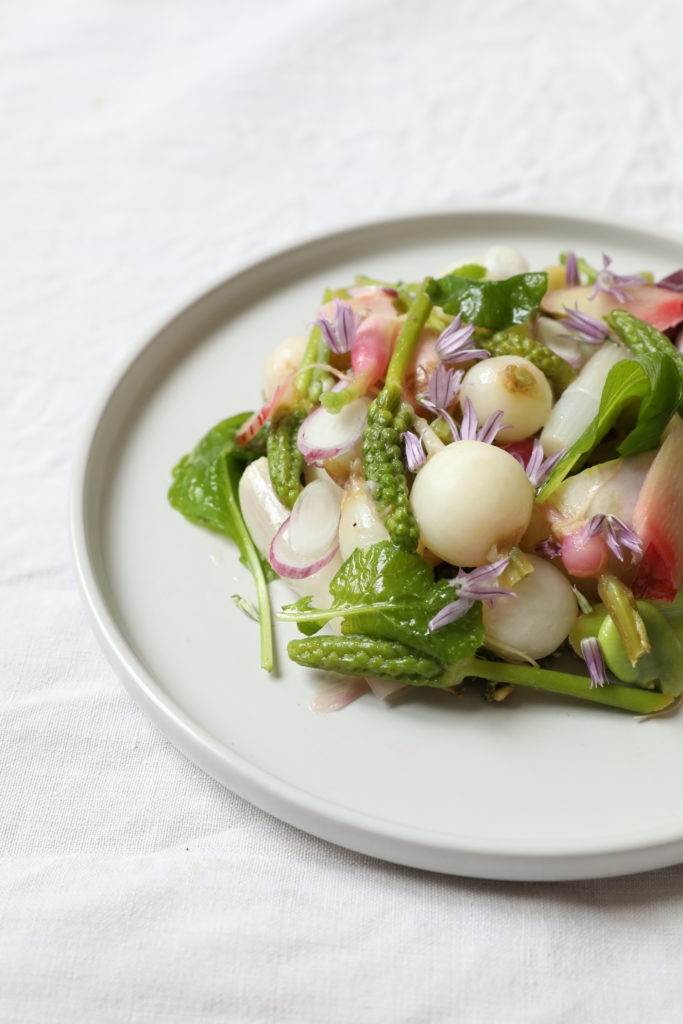The former top-level sportswoman dreams of a cuisine combining ecology, health and taste all at the same time. She is due to open her first restaurant at the end of the year.
We’re often a bit quick to describe a career path as ‘out of the ordinary’. But for Manon Fleury, this journalistic tag is true in every way. Nothing really predestined this top-level sportswoman, member of France’s junior sabre team, then first-year literary student on course to enter a prestigious university, to turn one day to cookery. There is, of course, and as always, an element of passing something on. The memory of those summers in her grandmother’s large orchard, “the fruits, the tarts and the jams” and also her mother’s dishes, who cooked organically, something quite unusual at that time. “I was raised on a diet of tofu!”, the young, 30-year-old says with a smile today. Perhaps just as much as cooking itself, Manon Fleury was especially mindful that “meals represent a time for sharing; the generosity of a dish that we cook to please others”.
For a time, the student imagined combining her two passions and becoming a food journalist. Before making this kind of decision which, on a whim, can change a life, she went to learn about cooking. And rather than choosing the classic route that was open to her – a higher national diploma in catering – she decided instead to go to Ferrandi, a leading school of culinary arts in Paris. The former top-level sportswoman became an apprentice, discovering a whole new world of work. “Just like sport, cooking is a bit of a world apart where rhythm, the physical and the mental are really important”. Mentally, it took a huge amount of effort to catch up on the two or three years that she was behind her classmates.
From the start, she made the decision to go to “signature restaurants with larger-than-life characters, sometimes divisive in their choices”, starting as an apprentice with William Ledeuil (at the Michelin-starred Ze Kitchen Galerie) and then notching up a number of experiences (with Alexandre Couillon, Pascal Barbot and the like). “You really had to merge into their universe, champion a committed undertaking that was all their own”. She remembers the trust put in her, the listening ear always there for her. “I try and do the same thing today”, she states. “Goodwill at the heart of the team is extremely important to me. I listen, I give commis chefs space to express themselves, so that everyone can have their say in the shared project, whether they’re a trainee or a chef de partie”.
The real turning point in her fledgling career came when, after graduating, she left for New York to join the Blue Hill Farm restaurant run by chef Dan Barber. To start with, she really had to get to grips with the English language. And there, she discovered a concept restaurant that doesn’t really exist in France. A farm-to-table restaurant working in partnership with a farm that produces exclusively for it. “I was already committed to various aspects, an interest in permaculture, the smart use of seasonal products, but there, I opened up to something completely different”, she recalls. In France, Michel Bras and Alain Passard were pioneers, with a plant-based cuisine that didn’t compromise on the quality of the dish or the way it looked. “But we didn’t perhaps go far enough on the issues of health and ecology which concern me every day of the week”, Manon Fleury explains. There is still a space to be conquered between plant-based cuisine, which is sometimes seen as a bit bland, and French cuisine. And this is what the young chef intends to devote the next few years to. “I want to show that you can combine ecology and health by offering dishes that are full of taste, where you get a warm welcome from the dish and aren’t faced with something too radical or austere”, she assures us. “We have to aim for a sort of simplicity, but it certainly shouldn’t look simple on the plate”. So, with attention to aesthetics, “but also to the jus, the sauces, to anything that will enhance the experience” of diners to her restaurant. For her, this is what will make all the difference. Her cuisine is 70% plant-based and meat protein is used more as a “condiment” than the centrepiece of a dish.
Last summer, she took over the reins in the kitchens at seasonal restaurant Elsa in Monaco, another ground-breaking eatery for its ethical and responsible cuisine. The menu was inspired by the nature of the Mediterranean: San Remo prawns with raspberries and nasturtium flower jelly, vegetable pie with herbs from the Domaine d’Agerbol market garden, pickled turnip with green olive cream and cherries… “I liked to develop my cooking with the products themselves”, she recalls. “For several months, for example, I worked on this vegetable pie, constructed like a millefeuille, which meant I could create a range of colours with the passing seasons. In May, it was more or less white with spring vegetables, then it was tinged with red (tomatoes, beetroot…), before taking on the yellow hues of autumn in October (squash, yellow peppers…)”.
In May, she will publish her first recipe book on cereals, intending to give them the recognition they deserve. Then, alongside this, she will be working on her big project, the one the pandemic set back a few months. We’re talking about the opening of her very first restaurant at the end of the year. And it will be in Paris, of course. After all, two years ago, she was named ‘Young Parisian Chef of the Year’, a prize awarded by magazine Elle à Table.
instagram.com/manonfleury__
Text : Cyrille Jouanno












